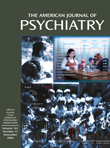Functionalizing Diagnostics
To the Editor: In his review of my book titled Pharmacotherapy for Mood, Anxiety, and Cognitive Disorders, edited by U. Halbreich and S.A. Montgomery, Donald F. Klein, M.D. (1), mentions my plea to “focus on the functional impairments” in psychiatric diagnosis and calls this approach “premature” (1, p. 166). By functionalization, I mean dissection of the psychiatric syndromes diagnosed in a given patient into their component parts, i.e., the psychopathological symptoms, followed by attempts to identify the psychic dysfunctions generating the phenomena that patients experience and observers register as psychopathological symptoms (2). The focus of biological psychiatry, we maintain, should be less on disease entities or syndromes than on exploring the neurobiological underpinnings of psychic (dys)functions (3).
“Van Praag,” Dr. Klein has it, “would have us give up the morass of comorbidly occurring syndromes and, in fact, the concept of disease entities to focus on the fundamental impairments that incur the psychopathological state” (1, p. 166)
This statement is only partly correct. I do see functionalization as an indispensable method for providing psychiatric diagnosis with a solid scientific bedrock. I have not suggested giving up syndromal and nosological diagnosis altogether but adding functionalization to the present diagnostic process (4).
Dr. Klein continues: “If we knew the brain functions that allow us to cogitate, emote, and behave, then Van Praag’s suggestion would resonate” (1, p. 166), but at present a functional psychopathological approach seems to him premature.
I disagree with him. If we ever want to know the “brain functions that allow us to cogitate, emote, and behave,” we first have to characterize the psychic dysfunctions that generate psychopathology. Systematic attempts to functionalize psychiatric diagnosing seem to me not premature but long overdue.
1. Klein DF: Book review, U Halbreich, SA Montgomery (eds): Pharmacotherapy for Mood, Anxiety, and Cognitive Disorders. Am J Psychiatry 2002; 159:165–166Link, Google Scholar
2. Van Praag HM, Leijnse B: Neubewertung des Syndroms: Skizze einer funktionellen Pathologie. Psychiatr Neurol Neurochir 1965; 68:50–66Medline, Google Scholar
3. Van Praag HM: Nosologomania: a disorder of psychiatry. World J Biol Psychiatry 2000; 1:151–158Crossref, Medline, Google Scholar
4. Van Praag HM: Over the mainstream: diagnostic requirements for biological psychiatric research. Psychiatry Res 1997; 72:201–212Crossref, Medline, Google Scholar



